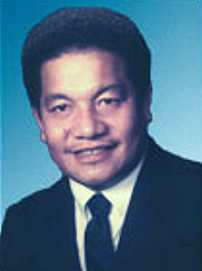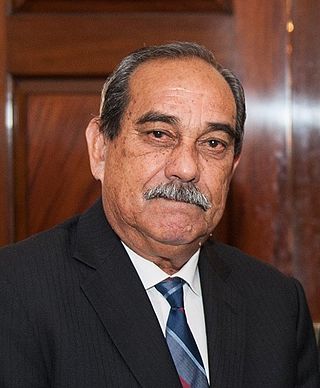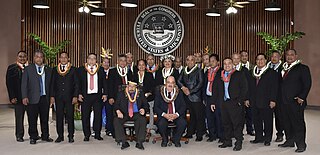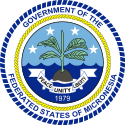
The politics of the Federated States of Micronesia (FSM) takes place in a framework of a federal assembly-independent representative democratic republic. The President of the Federated States of Micronesia is both head of state and head of government. Executive power is exercised by the president and his cabinet, while legislative power is vested in both the president and the Congress. The judiciary is independent of the executive and the legislature.

Joseph John "Joe" Urusemal is a Micronesian political figure who served as the sixth President of the Federated States of Micronesia from 2003 until 2007.

John Richard Haglelgam is a Micronesian former politician who served as the second President of the Federated States of Micronesia.

The Congress of the Federated States of Micronesia has 14 non-partisan members: ten members elected for a two-year term in ten single-seat constituencies and four members elected for a four-year term, one from each state at-large.

Parliamentary elections were held in the Federated States of Micronesia on 6 March 2007, alongside a double referendum. Thirty-five candidates competed for the fourteen seats in Congress. As there were no political parties, all candidates ran as independents.

Parliamentary elections were held in the Federated States of Micronesia on 8 March 2005, alongside a three-part referendum. As no political parties existed, all 23 candidates for the 10 available seats in Congress ran as Independents.

The vice president of Federated States of Micronesia is the second highest position in Federated States of Micronesia. The vice president is elected by the Congress of the Federated States of Micronesia from among the at-large members for a four-year term. The vice president is also a part of the legislature. The annual salary of the vice president is set to US$70,000.

Parliamentary elections were held in the Federated States of Micronesia on 3 March 2009. As there were no political parties, all 21 candidates ran as independents. Three were returned unopposed.

Parliamentary elections were held in the Federated States of Micronesia on 8 March 2011, alongside a three-part referendum. As there were no political parties, all 34 candidates ran as independents. For the first time in the country's history, two women ran for election, both in Chuuk State. However, neither was elected.

Parliamentary elections were held in the Federated States of Micronesia on 4 March 1997, alongside a referendum on tax revenues. All candidates for seats in Congress ran as independents.

A referendum on congressional terms was held in the Federated States of Micronesia on 7 March 1995. The proposal to set a four-year term for all members of the Congress required the approval of three-quarters of the voters in at least three of the four states. However, it was only approved by a majority of voters in Kosrae and Yap.

A constitutional referendum was held in the Federated States of Micronesia on 27 August 2002. Voters were asked whether they approved of 14 separate amendments to the country's constitution. To be approved, the proposal required at least 75% of voters in at least three of the four states to vote in favour. Ultimately all 14 proposals were rejected, as none passed the 75% threshold in any state.

Parliamentary elections were held in the Federated States of Micronesia on 4 March 2003. As there were no political parties, all 28 candidates ran as independents. Four candidates were elected unopposed.

Parliamentary elections were held in the Federated States of Micronesia on 3 March 2015. A simultaneous independence referendum was also scheduled to be held in Chuuk State, but was postponed shortly before the elections.

An independence referendum for Chuuk State to secede from the Federated States of Micronesia was originally scheduled to take place in March 2015. However, it has been delayed three times and it is uncertain if it will take place. The most populous of the four states within the FSM, Chuuk has high levels of unemployment and there are long-standing tensions over the distribution of funding within the FSM. Other concerns include political power within the federation and the preservation of cultural identity.

Peter Martin Christian Souissa is a Micronesian politician who served as the 8th President of the Federated States of Micronesia, from 11 May 2015 to 11 May 2019.

Parliamentary elections were held in the Federated States of Micronesia on 7 March 2017, alongside a referendum on allowing dual citizenship. Although the proposed constitutional amendment to allow dual citizenship was approved by a majority of voters, it did not pass the threshold of 75% voting in favour in at least three of the four states.

Parliamentary elections were held in the Federated States of Micronesia on 5 March 2019, alongside a referendum on calling a Constitutional Convention. All 14 seats in Congress were up for election, and all 13 incumbents standing for re-election were returned to Congress.

Parliamentary elections were held in the Federated States of Micronesia on 2 March 2021, to elect ten of the fourteen seats of the Congress of Micronesia for a two-year term. There are no political parties and all candidates stood as independents.

A referendum on nine proposed amendments to the constitution was held in Micronesia on 4 July 2023. Eight of the amendments were proposed by the Constitutional Convention elected in 2019, and one amendment was proposed by Congress. All nine amendments passed, and were officially ratified by President Simina on 4 October 2023.






